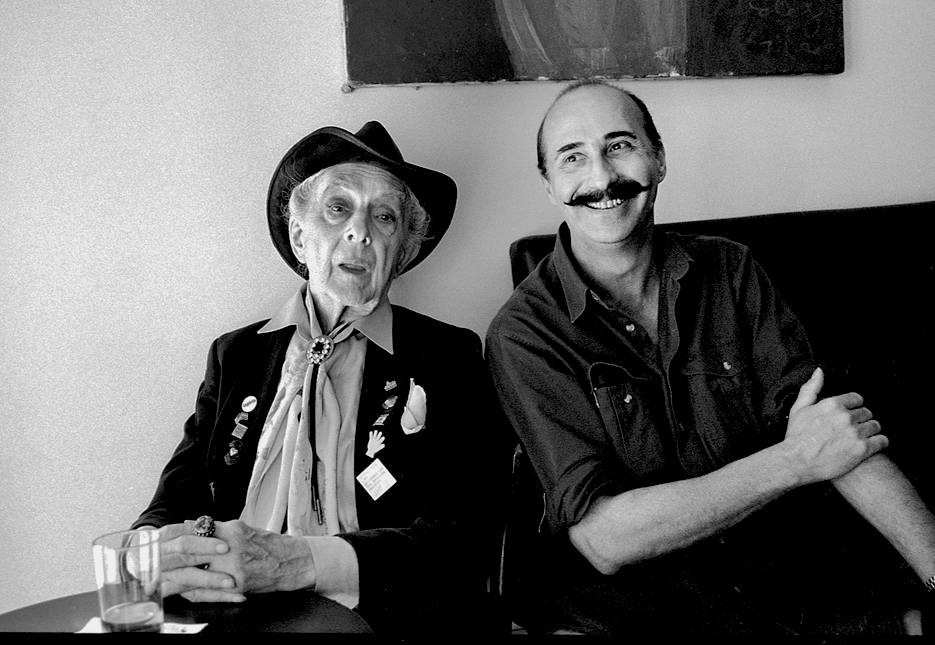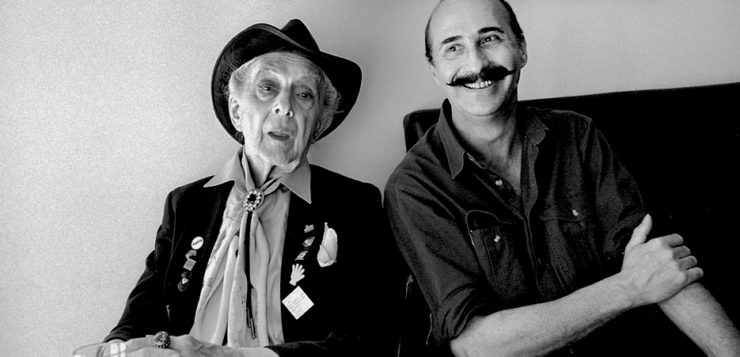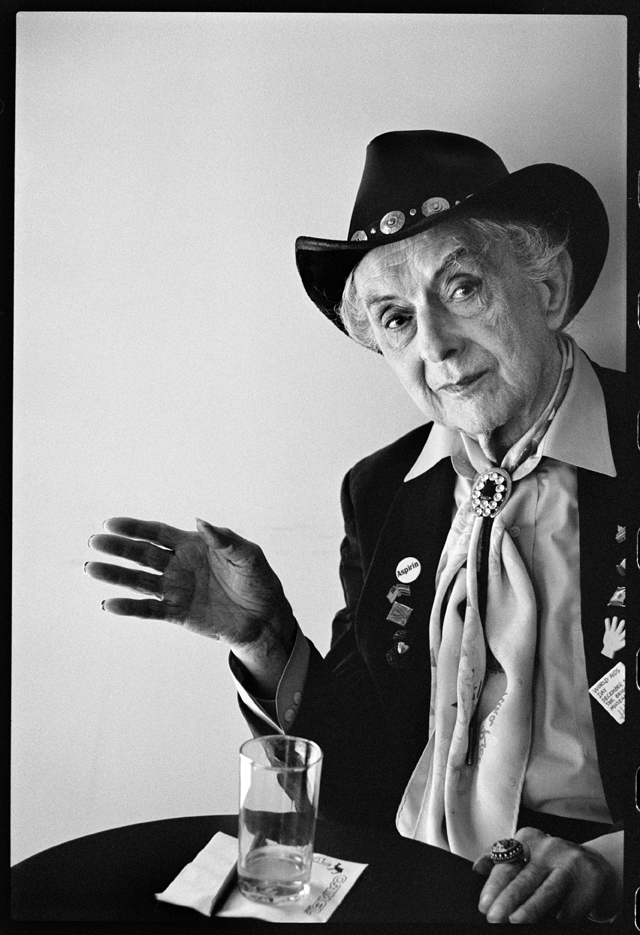Last November 21st marked twenty years since the death of Quentin Crisp (1908–1999). The man for whom Sting wrote “An Englishman in New York” died of a heart attack at age ninety in Manchester, England, where he had returned after eighteen years in New York to appear in his famous one-man show “An Evening with Quentin Crisp,” which he started performing in 1978.
A writer and actor as well as a model for Calvin Klein and Levi’s, Crisp stood out for his inexhaustible wit, which many compared to that of Oscar Wilde. He became widely known in 1975 when ITV made a film based on his autobiographical book The Naked Civil Servant, starring John Hurt. In 2000, his wax figure was installed in Madame Tussauds New York.
The Greek painter and photographer Dimitris Yeros, a friend during Crisp’s New York years, wrote the following in his memory. He took a series of photos during a 1998 visit to New York.
— Nick Lingris, Translator
DOES ANYONE DOUBT that most autobiographers distort reality, embellishing the truth about themselves, altering the facts relating to third parties, and presenting things in their own best interest? This makes Quentin Crisp’s case exceptional. He achieved something that was almost beyond the humanly possible: removing the writer from this paradoxical existence of the self and setting him down to calmly watch his tumultuous, scandalous, suspenseful, adventurous and often tragic life go by. He recorded it all with honesty, precisely as he saw it unfold, withholding nothing and showing himself willing to poke fun at himself.
Quentin the person was entirely consistent with Crisp the writer and public figure. He seemed to admire himself for the doggedness with which he persisted with behavior that was utterly unusual—visually speaking, primarily—as well as for his indifference to the consequences and all the unpleasant things that happened at his expense. He would simply record it all, not sparing a thought for the uproar his behavior would cause, so we could learn about a life many would consider possible in books alone. But Quentin not only existed in real life, where he was spectacularly present for ninety years, he was also exactly as he described himself in his book The Naked Civil Servant.

The unsuspecting passerby who happened to run into Quentin Crisp on the street would be unsure of his precise gender. In fact, I think many harbored doubts until the end. When, once, it crossed my mind to photograph him without the gentleman’s hat that never left his head and shared the idea with my agent, he urged me not to do so, anticipating a reaction that would be indistinguishable from that of an elderly lady!
In the morning, Quentin would attend to various chores around the block he called home on Manhattan’s Lower East Side, heavily made up, wearing green eyeshadow and heavy eyeliner, brown lipstick, and light-toned powder all over his face. His nails, which for the last two years had been misshapen and unvarnished, were so long he had a hard time pulling the foil off the single-serve milk portions for his coffee. He always wore one or more tawdry rings, with large, colorful glass stones. In his final years, his left hand had seized up and was almost useless, which stopped him doing many of the things he was used to, including, I imagine, taking care of his nails. Perhaps that was also why his long hair was its natural color, not the blue he preferred. He wore tatty old-fashioned shirts with enormous lapels, which he wore outside his jacket and matched with printed scarves in similar hues, wrapped around his neck and held in place with large rhinestone brooches. His jacket, trousers, and shoes were nondescript. The shoes, in particular, were nothing like the ones he’d favored in his youth, which, for the sake of elegance, he’d worn several sizes too small. The shoes of his latter years were flat, without heels, comfortable enough for him to walk in without getting tired.
He was thin, slightly built, and agile till the end. In our second-to-last meeting, his health had taken a turn for the worse. The doctors had recommended that his arm be amputated, but he had refused. His disability meant he couldn’t type, so he had stopped sending his articles to the Manchester newspaper he wrote for, which had earned him a small but much-needed income. At the same time, his agent had died, and he’d had to turn to a foundation, agreeing to leave them the rights to his books in exchange for their taking care of him should he ever become incapacitated. He was very calm while he talked to me about all this, and he seemed to enjoy watching the passersby through the window of the cheap neighborhood coffee shop, sitting in a somewhat rigid, upright position and striking quite a feminine pose.
Quentin left for New York in 1977 and found himself more accepted and admired there than he’d been back home. He also found more money, which he liked to save for the future, since one didn’t know—as he was quick to point out—when one was going to die, and one should always have something set aside for any eventuality. His only comment when I showed him the Greek translation of The Naked Civil Servant, published by Cactus, was that he had not received a penny for it and that his agent had never mentioned it to him. He didn’t say anything else or want to know how good the translation was or how many copies it had sold in Greece. Was it that the Greek reading public was too small for his ambitions, or had he had enough of the fame for which he’d fought so hard—was he past all that? However, money, of which he had never had enough, was forever in his thoughts, something he didn’t hide from anyone.
Nevertheless, he kept two accounts in one New York bank, which means he had at least a hundred thousand dollars in one of them. This was something his late agent had revealed to mine. Once, when Quentin simply wouldn’t stop grumbling to me about his finances, I couldn’t resist mentioning this. He admitted to it with a smile, pleading the unknowability of the future in his defense. That’s why he lived, as he’d always done, in a small room with a shared bathroom for which he paid only $300 a month in rent. He hadn’t bought a single item of clothing since the day he’d arrived in New York. But in England, too, as he confessed in his autobiography, he had preferred to wear friends’ hand-me-downs to buying new clothes.
At the beginning of our acquaintance, we used to eat at a fourth-class Greek coffee shop where the food was cheap, though someone else would pick up the tab most of the time. It was a source of immense pleasure to Quentin that there were so many people who would pay the four dollars for his meal. Every day, friends and acquaintances would meet up with him at half-past noon in that dive on the corner of East Fifth Street and Second Avenue, where he’d have an omelet sandwich with mashed potatoes and enormous cups of coffee, which he drank with an excessive amount of sugar.
Quentin remained sprightly until his sudden death and would walk the streets come rain or shine, delighted when someone recognized him and never refusing requests for a photograph. God, in whom he had no confidence due to the observation that God was never going to answer any of his prayers, granted him years without cholesterol or diabetes. There was another reason he liked going to that Greek coffee shop where even the hot chocolate was a disaster: they didn’t play music, which meant he could converse. “Converse” is probably the wrong word, because he either half-listened to what the others had to say (though he immediately forgot what they had said) or told stories himself which, though short, were numerous. He would start right after he’d finished his sandwich. With the first lull in the conversation, he would seize the floor and keep it until everyone was exhausted. Of course, his stories were genuinely interesting and often hilarious. His eloquence was matchless. He had an extraordinary mastery of language, never made mistakes in grammar or usage, and avoided tiring repetitions. You’d think he had prepared himself beforehand, that he had learned his lines by heart. The truth is that he expressed himself easily and articulately, both orally and in writing. This became clear to me after I gave him a copy of my book Theory of the Nude (1998), and he called me on the phone two hours later and read me something he had already written while browsing through it.
What was even more remarkable, though, was the manner in which he would tell his stories. Declaiming in the hoarse voice that you may remember from his appearance as Queen Elizabeth I in the 1992 movie Orlando, he would imitate the characters in his stories in a clearly articulated theatrical manner, starting in low tones before switching to crescendos of sound and gesture, only to end the story quiet and calm again. I don’t know how much he had cultivated this style of narration, but, apart from being his favorite, it was also extremely effective.
Quentin always wanted to be the center of attention. From a young age, he’d had a tendency to provoke to draw attention to himself. I’m quite certain he would have gone off to bed feeling satisfied, even delirious with joy, if the whole block had come out to jeer at him during his daily stroll. This rarely happened in New York, however, though at our favorite coffee shop the waiters would shout his order through to the kitchen in highly expressive Greek that you could translate as “Give us one fruity omelet!” I heard it repeated every time I was there, and marveled at their hypocrisy, because apart from that they were all bows and servility. Then one day Quentin told them I was Greek, and they stopped their jeers—at least when I was present.
His favorite exclamation, like that of every proper Englishman, was “Wow!” He used it whenever he wasn’t at all interested in what someone else was saying, but also when something surprised him. In the former case, it was more of a brief and colorless “ow”; in the latter, it was accompanied by a lifted eyebrow or, when he was even more surprised, a little jump on the spot. Although he was indifferent to news about the Greek edition of his autobiography, his reaction was altogether different when I told him once he was Boy George’s idol. This “wow” was followed by a smile of satisfaction that stayed in place for quite some time. At our last meeting, knowing how happy it would make him, I told him that Kirk Douglas, with whom we had shared a box at the Met to watch Tchaikovsky’s rather dull opera Mazeppa, also held him in high esteem, and so did Robert De Niro, who had told me so himself in San Francisco at the opening of an exhibition of his father’s paintings. It doesn’t matter how successful someone is; it’s only human to take pleasure in hearing good things about ourselves, especially when the speaker is someone who’s widely respected.
Still, I have to say that I expected such a knowledgeable gay man with his education who had been a spokesperson for gay rights to be able to recite Cavafy by heart. And yet Cavafy had totally eluded him. Quentin hadn’t even heard of him. I should note here that I met Quentin for the first time when he was already quite elderly, and his memory was not at its best. Although he could comment on current events with great clarity and still write very well, if I mentioned something we had talked about the day before, there was a good chance he would have forgotten all about it. I was present on at least four occasions when a generous lady who seemed to know him well bought him dinner. But he, using his bad memory as an excuse, never recognized her and would ask her to introduce herself again whenever they met. All the same, he never forgot anything that genuinely interested him, and he could recall his distant past in great detail. Although Cavafy is not someone that a well-educated and committed person like Quentin Crisp was likely to forget, I prefer to attribute that lapse to memory loss. On the other hand, given his interest in cinema, he knew Cacoyannis’ Zorba, Elia Kazan’s films, and Melina Mercouri.
I could never have met Quentin in any of the other restaurants that he frequented, as I wouldn’t be caught dead in any of those dumps. I was actually introduced to Quentin by my agent, who insisted that I ask him to write the introduction to my book Theory of the Nude. But it took me two years to find a publisher, and when I finally did, I preferred to go with Peter Weiermair for the introduction, as he specialized in photography books and was better versed in using the telex. The financial worries that had made Quentin’s life so hard prevented him from ever traveling to Greece, where, at a younger age, I’m sure he would have quite enjoyed the company of my compatriots.
Quentin was a pioneer, chiefly through his defense of human rights. With courage that often bordered on the cheeky he put up an uncompromising fight against hypocrisy. Today he is a legend of the LGBT community. He never wished ill on anyone; he was both lovable and loved.
Translated from the Greek by Nick Lingris.
Dimitris is an Athens-based artist and photographer whose works have been shown at 58 solo exhibitions around the world to date.







